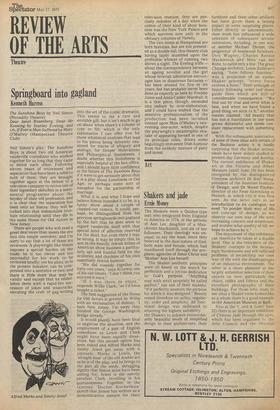Theatre
Springboard into gagland
Kenneth Hurren
The Sunshine Boys by Neil Simon (Piccadilly Theatre) Dear Janet Rosenberg, Dear MrKooning by Stanley Eveling; and Oh, If Ever a Man Suffered by Mary O'Malley (Hampstead Theatre Club) Neil Simon's play, The Sunshine Boys, is about two old American vaudeville comedians who worked together for so long that they came to detest each other. Following eleven years of retirement and separation that have been a relief to both of them, they are brought together again at the behest of a television company to revive one of their legendary sketches in a sentimental programme about the heydey of their old profession, and it is clear that the separation has been only an hiatus: they will be locked into that indissoluble lovehate relationship until they die in the same Home for Old Actors in New Jersey.
There are people who will read a great deal more than meets the eye into this simple anecdote, and I'm sorry to say that a lot of them are reviewers. A playwright like Simon imposes a special burden on the trade: he is too clever and too successful for his work to be reviewed briefly; yet his plots, as in the present instance, can be compressed into a sentence or two, and there is little more that may be validly said except that he embellishes them with a rapid-fire succession of jokes and wisecracks, elevating the craft of gag-writing
into the art of the comic dramatist. This seems to me a rare and enviable gift, but it isn't much to go on about when there's a column of type to fill; which is the only explanation I can offer you for those whimsical analyses that lead to his pieces being minutely examined for traces of allegory and analogy, for Deeper Motivations and Philosophical Statements. I doubt whether this foolishness is especially helpful at the box office, and I should have little confidence in the future of The Sunshine Boys if it were to get seriously about that it is a play about Loneliness or Old Age, or perhaps some sort of metaphor for the partnership of marriage.
What it is, and what I hope and believe Simon intended it to be, is a funny show about a couple of clapped-out comics. It could, perhaps, be distinguiShed from his previous springboards into gagland by the fact that he does seem to regard vaudeville itself with that special kind of affection reserved for the dead, but even there I may be wrong. It may be simply that he saw in the heavily Jewish milieu of American show business a particularly apt and fruitful field for the drolleries and rhythms of his own essentially Jewish humour.
"We did comedy together for forty-one years," says Al Lewis, one of his old-timers. "I don't think you enjoyed it once."
"If I was there to enjoy," responds Willie Clark, "so I'd have bought a ticket."
The first suggestion of the Home for Old Actors is greeted by Willie with an exclamation of dismay: "I hate New Joisey, I'm sorry they finished the George Washington Bridge already." It would plainly have been fatal to anglicise the situation, and the employment of a pair of English comedians as Lewis and Clark might have been equally disastrous, but this second option has been risked and Alfred Marks and Jimmy Jewel get away with it joyously. Marks is Lewis, the 'straight man' of the old double-act as he is of the play, and he brings to the part all the seedy, shrugging dignity that Simon must have been aiming for; Jewel is the nervily petulant Clark, revelling in his querulousness. Together, in the raucous 'Doctor Kockelman' sketch that Simon has written as a demonstration sample for their television reunion, they are precisely redolent of a day when the centre of their kind of show business was the New York Palace and which survives now only in the obituary columns of Variety.
The two items at Hampstead are both brevities, but are not presented as a double-bill, this theatre club having lately stumbled upon the profitable wheeze of running two shows a night. The Eveling trifle — about the correspondence between an ageing novelist and the girl whose feverish admiration encourages him in disastrous fantasies has been around for five or six years, but has probably never been done as expertly as here by Freddie Jones and Anna Calder-Marshall. It is a thin piece, though, extended into tedium by over-elaboration, and I could have wished that the sensitive professionalism of the production had been lavished instead upon Miss O'Malley's lateevening one-acter, which, despite the playwright's catastrophic mistake of appearing herself in one of its principal roles, draws some beguilingly irreverent Irish humour from the unlikely mixture of piety and incest.


























 Previous page
Previous page